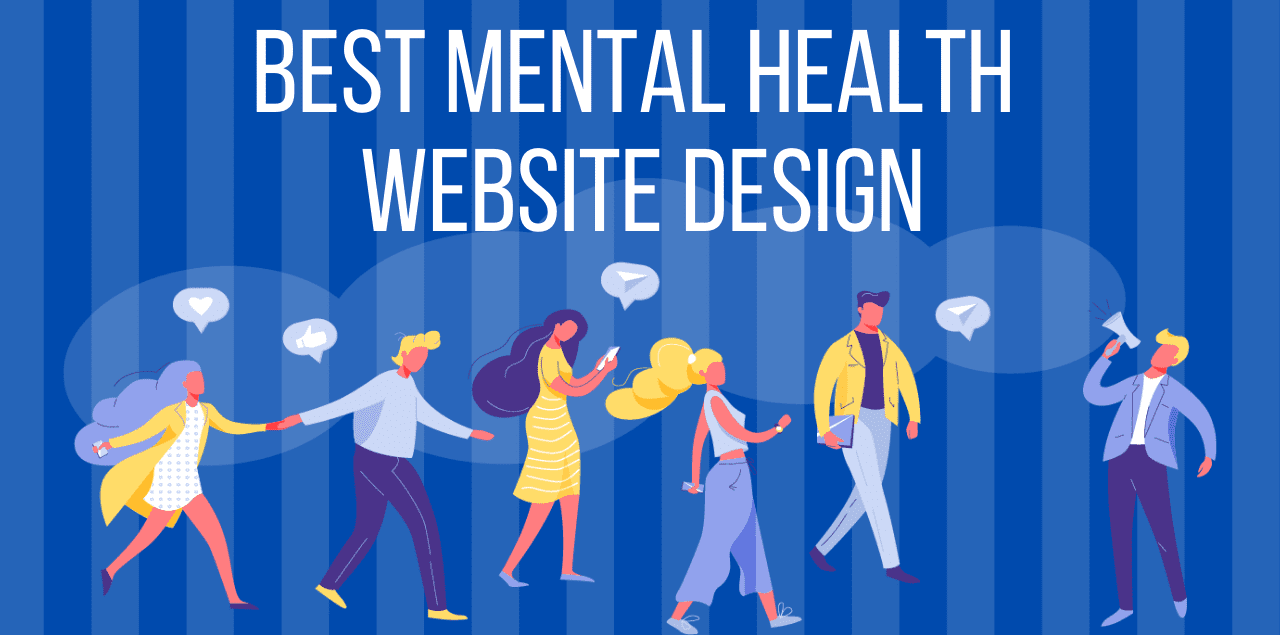Tips on Website Design For Mental Health Professionals

As a mental health professional, you are incredibly skilled at building trust and creating rapport one-on-one. Your clients appreciate your calm demeanor, your ability to help them gain clarity and work through complex problems, and your uncanny ability to create a tranquil environment for patients in your practice. Your skills are so sharp that people spread a positive message about them through word of mouth. The question of what is the right approach to creating the best mental health website design might seem unimportant, given the many skills you have mastered already!
However, word of mouth advertising only goes so far in the digital age we live in today. A website is an essential part of growing your business as a business owner.

A lot of mental health professionals are not exactly too keen on the idea of “selling a product.” While they know they need a presence in the business world, their main objective is not to sell a product but rather to reach out and offer a helping hand to anyone in need.
Everyone deserves to earn a living; however, mental health professionals are not here to just line their pockets using their amazing skills. They are here to heal. It is ok to earn money in this profession as long as you’re not doing anything fraudulent, and making money is not your only motivator.
(Click here to read a blog post about the crucial mindset shift that modern therapists need to make!)
As you enter the world of business and having a website, it is important to remember that content is king. You may have a downright beautifully crafted and well-maintained website, but it is the content you put on it that is going to reel in and keep visitors coming to your page.
One concept that is important to keep in mind is something called Search Engine Optimization, SEO for short.
Trust me. It is not as complex as it may sound. You’re a mental health professional, and you love to write. You can count on your business to rapidly expand using some of the SEO tricks that I am about to share with you.
Let’s dive into the things that you should think about as you’re developing content for your mental health website.
Top Tip on Website Design For Mental Health Professionals: Quality Over Quantity
It seems obvious, but it is truly alarming how many people disregard this principle. They think, “oh, the more posts and more stuff I put in my posts, the more likely I am to be discovered on the web.”
(Learn more about common myths about therapist websites here!)
That idea has been tried and tested numerous times, and I will tell you flat-out that it will not work. It is a poor strategy that will end up hurting your business in the long run. People are going to just get tired of seeing poor content, and you will rapidly lose your credibility.
Think about what goes into a quality content post. A lot of time, road mapping, and thought. It has an overarching agenda. What exactly is that overarching agenda?
To get people to make a move. Jump on the perceived opportunity to seize the attention of visitors. They’re not just visitors. They are potential clients to your clinic.
Set the mood for what those potential clients can expect when they visit your clinic by possibly embedding videos and pictures. Give the visitor an opportunity to create an image in their head of what the experience is going to be like.

We all have those blog posts that we have saved on our bookmarks bar because we plan to revisit them or share them with a friend. (For example, I have gotten a tremendous amount of positive feedback about the free video course I created about creating a successful therapist website, and about the top ten post I created with the best mental health website examples I could find on the web.)
Even more, you want visitors to interact with the page and its posts. That is how you know that you are connecting with them.
Rather than create another post from scratch, how about you optimize the ones that are getting the most engagement. This is what is going to separate you from other professionals who are attempting to personally connect with their clientele.
Some key take-aways to keep in mind:
DO:
- Focus on Quality. With effort, your website can be an excellent example of mental health website design!
- Invest time in each of your pieces of content.
- Use more than one kind of media: pictures, video, audio are all great! (See a great example of images being used well on this client website!)
- Go back to older posts and make them even better!
DON'T:
- Publish content just for the sake of getting “something” out there.
- Create content that you aren’t proud of.
- Assume that older posts are a lost cause – adding pictures, additional text, and revised content can bring an older post to life!
Suggestion 2: Be Deliberate with Your Posts, and Don’t Rely on Social Media
Have a plan and stick to it. Every business and every individual, whether they are cognizant of it or not, is marketing themselves. It is most relevant to social media to which nearly everyone has access to today.
In regard to SEO, utilizing solely social media platforms is not going to cut it. What you really need is for other websites to directly link their content back to your website. That is the true value of SEO.
This happens through podcasting, email lists, or webinars. These are organic ways to grow your audience and have people refer back to your page.
attempting to personally connect with their clientele.
Look at particular posts you have developed and identify the key places where you think people might best connect with your content. The strategy of something called link roundups is an outstanding way to spread content around the internet.
This works well because you can directly deliver a message to a blogger who might be able to benefit from the post. Send them a kind message, which will not feel fraudulent because you’re giving them something worthwhile.
Do this often as you will foster positive relationships in which you will be able to grow with other like-minded people who are interested in growing their business as big as they possibly can.
Conduct a thorough analysis of the content posts that you believe will be shared across the internet most often.

Some key take-aways to keep in mind:
DO:
- Use more than one channel to communicate with your audience.
- Focus on building content on platforms that you own.
- Step back and look at what’s working, and focus your energy on efforts that are getting traction.
DON'T:
- Put all your “eggs” in one basket.
- Assume that the social media platform you like today will still like YOU tomorrow. Algorithms change. Platforms evolve. Unless you own the platform (such as your own website) don’t rely on it too heavily.
Suggestion 3: Pay Attention to Complimentary Businesses
In the world of business, you will find that there are many multi-faceted businesses that are good at many different things. There are businesses that help multiple independent businesses at a time, including yourself.
This garners a good relationship with other businesses because you’re not necessarily fighting for clients anymore, but you are helping each other gain clients—a big shift in mindset.

Think about some businesses with whom you would like to collaborate that could potentially be the spark that helps your business grow. How could you incorporate yourself into the daily jargon of those bigger businesses and possibly get the clout you need?
Over time, the relationship you’ve built will be fortified by constantly building each other up.
SEO is not just written posts; it is driving external web traffic from virtually anywhere in the form of being mentioned by voice on podcasts or videos.
Therefore, it would be in your best interest to partner up with complementary businesses that really have nothing but good intentions for your personal business. As long as you’re helping them win, they’ll want to see you win too.
Final Thought
SEO is the most vital part of a website design for mental health professionals, but keep in mind that perfecting SEO takes time. Do not be discouraged if you are not quite getting the traffic you need. You are a mental health professional, and you have a great deal to offer, in addition to having the best mental health website design.
Patience is one of your shining virtues, and you will make this work with consistency and quality posts. Patients will feel the most comfortable connecting with your authenticity and willingness to help.
The overarching goal of your business is to answer the cry for help in a society that stigmatizes mental health issues. Remember that as you begin to make plans for the design, and create content for your website. If you’d like some help as you think things through, schedule a free 30-minute discovery call with me!
What do you think?
Do you agree with the points made in this post?
What is the first thing from this article that you are going to take action on?
What questions do you have about what you’ve read?
Leave a quick comment below and let me know!
Did you like this post? Share it!
Related Reads for Starting and Branding Your Practice:
- Branding And Therapist Logo – Use Your Therapist Logo Consistently
- Branding Your Mental Health Private Practice
- Professional Website Fonts: Choose the Right Typography for Your Therapy Website
- Counseling Practice Names for Branding and Website
- Photos for Your Therapy Website | Counseling Stock Photos
- Logo Designer – Looking for a Professional Designer
- Benefits of a Logo for your Therapist Branding
- Therapist Logo Design – Define Your Brand Identity
- Therapist Logo Examples – Inspiration for Therapist Logos
- Therapist Logo Ideas – Find Inspiration in the World Around You!
- Different Logo Types for Therapist Business Branding
- Your Therapist Logo: The Ultimate Guide – Therapist Website Design
- Tools for Small Businesses: Low-cost Social Media Tools For Your Biz
- User-Friendly Website Templates For Therapists
- Web design for Counselors – Private Practice Websites
- Web Design for Psychologists: A simple guide – Therapist Website Design
- Website For Forensic Psychology Practice –4 Factors to Consider When Choosing the Best Mental Health Website Design
- 4 Ways to Identify Web Design Goals for Your Therapy Website
- How to Choose Your Therapy Niche and Get More Clients
- I Want a Website for My Business: A Beginner’s Guide to Getting Started
- Affordable Web Designers for Therapists: Expert Solutions Guide
- Affordable Website Development for Counseling Professionals
- Tips on Website design for Mental Health Professionals
Need any of the following?
- Web Design And SEO Services
- Done-For-You Therapist Website Template
- Professional and Customised Web Design
Here are some Sample Websites We’ve Created:
Check out our Portfolio for more!
Hi! I’m Sarah.
I help counselors and therapists have a bigger impact on the world through better client connection. I do this by creating beautiful visuals and strategically designed websites.


2 thoughts on “Tips on Website design for Mental Health Professionals”
Pretty! This was an incredibly wonderful article. Thank you
for providing these details.
very informative.. thank you